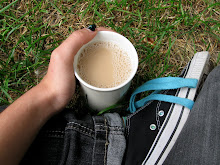Well, it might at least be good to hold off on obsessively reading Choosing Raw. Every second entry seems to set me off into a maelstrom of introspection and philosophical ramblings, and that kind of existentialist nonsense seriously can't be good for my health. In all fairness, though, it was not Gena's entry that got me thinking, this time. No, it was a comment on an entry.
"The cookbook author Deborah Madison writes the more intact a culture is, the fewer cookbooks it produce." (sic)
I can't verify that Madison wrote any such thing, because Google is being coy and I'm feeling lazy, but whether or not the statement is correctly attributed is less important than the assertion of its claim - I have no idea who Deborah Madison is, and I don't really care either way what she herself may or may not have specifically said. It's the idea that matters.
Is it true? Well, I don't know. I'm not going to lie or posture about it; I'm not sure. Maybe. We'll go with maybe.
See, in one sense of the word 'intact,' the statement is correct. A small, tight-knit community, one which operates like a close family, hardly has any need of a written record of instructions for domestic tasks. There's really not much need for a written record of anything, for that matter. Anything that is known by one individual can be as easily and quickly conveyed by demonstration and word of mouth. Knowledge is passed through the generations directly. What need is there for a written recipe for stew when you've grown up watching your mother make it the way she grew up watching her mother make it? Why would you need to read a novel when the myths of your culture are practically alive?
In this sense, the cultures of the present day are certainly 'broken.' We don't live in small, tight groups. We may meet dozens of new people every single day of our natural lives. We may live in cities where we don't even know everyone on our block, let alone everyone who falls under the same strata council, or the same waste collection. We don't live with our parents and grandparents, our children and grandchildren. As I write this, I'm in the northeast of Scotland, my father is on the west coast of Canada, my siblings are in California, and the closest relative I have (geographically speaking) lives somewhere near Manchester.
The people to whom we're genetically a close match and the people who live within walking distance of our front doors are no longer our neighbours. Our culture is not determined by biology or proximity. Culture is global. Connections span the entire face of the planet. But a worldwide culture is not just a scaled-up version of the smaller models that preceded it; nor is it merely the result of the bleeding together of all the previous collectives. With postal services and telephones and mass media and the internet, society become a fine mesh of overlapping threads, connecting individuals indiscriminately of distance or background; rather linking people by ideas and ideals.
In a society without cookbooks, where does that leave vegans? Nobody is going to argue that vegans are a minority group. There are places we seem to crop up like weeds, but no matter how many dandelions you see crowded beneath the hose spigot, there will always be one or two in the middle of the lawn or out by the rhododendrons. Somewhere out there, someone newly resolved to abstain from any and all animal products is wondering how to make cupcakes without eggs, what the hell they're supposed to do with this 'tofu' stuff anyway, and, the ever-pressing question, what to serve their Aunt Maisie to prove that they really are eating food. Fair enough, this vegan likely would never have existed without the widespread communications and information and media and this that and the other thing, but even if they otherwise lived in an 'intact' community, someone who is different from the norm isn't going to last long trying to make their way on their own. With Veganomicon? Things are looking a lot brighter.
I mean, that wasn't the point of the comment, I know. The point the author of that comment intended was something more along the lines of: 'We're all disconnected from our own basic needs and from each other, so we try and engineer a better version, but only come up short of the real thing.' That's totally valid. I agree. I think the surge in popularity of cookbooks and food blogs and Food Network reality television is very strongly linked to the tendency to disengage from ourselves and from each other. Quite frankly, I find the fascination for what someone else has eaten in a day a little - well, extremely - weird. At the same time, here I am reading Choosing Raw. I certainly live in a glass house.
I think it's sad that in a time when we have more and more ways to connect with one another, when we know more and more about how to nourish our minds and our bodies, when we can be anywhere in the world in mere moments, we seal ourselves away in a bubble of artificial life. I think there's a place for cookbooks. That place is not at the head of the dinner table, while we lie prone on the plate.
Saftiger Mohn-Marzipan-Marmorkuchen
4 years ago


No comments:
Post a Comment